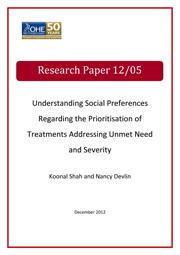Sign up to our newsletter Subscribe
Analysing Global Immunisation Expenditure

The UK Government is proposing to include “burden of illness” criteria in its scheme for value based pricing of branded medicines, potentially according higher rewards to medicines that treat more burdensome diseases. The 2010 Consultation Document includes a definition of burden of illness that…
The UK Government is proposing to include “burden of illness” criteria in its scheme for value based pricing of branded medicines, potentially according higher rewards to medicines that treat more burdensome diseases. The 2010 Consultation Document includes a definition of burden of illness that incorporates both severity (length or quality of life) and “unmet need” (whether and what treatment exists). Little empirical evidence is available, however, on societal attitudes towards these definitions.
In this exploratory study, Shah and Devlin tested one approach to eliciting public preferences about allocating health care resources based on disease severity and unmet need. They found that maximising health gain was considered by most of those interviewed to be more important than giving priority to the severely ill or treating patients with unmet medical needs. The authors note that some of the study’s findings contradict other empirical studies and caution that framing effects can have a powerful influence on any such research.
Understanding Social Preferences Regarding the Prioritisation of Treatments Addressing Unmet Need and Severity
Shah, K. and Devlin, N.
(2012) Understanding Social Preferences Regarding the Prioritisation of Treatments Addressing Unmet Need and Severity. OHE Grant-Funded Research. Available from https://www.ohe.org/publications/understanding-social-preferences-regarding-prioritisation-treatments-addressing-unmet/
